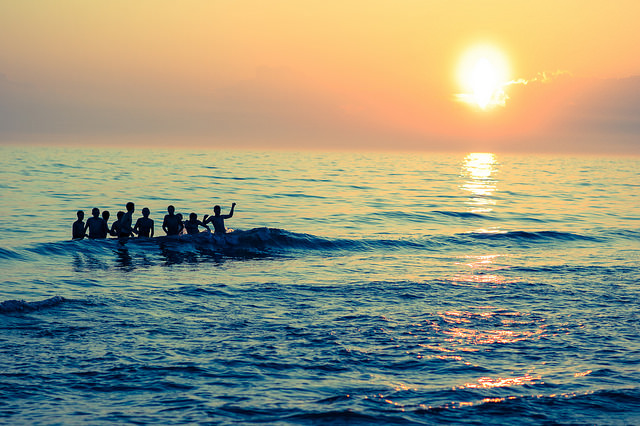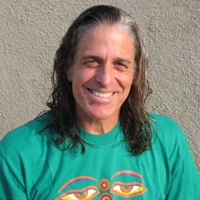I sat on the beach—18 years old and heartbroken.
My girlfriend, who had been drifting into other things and other friends was acting disconnected and distant. We had been together earlier that day, and maybe I felt the premonition of things to come.
I’m not sure how or why, but in that moment, I sort of blurted out, “I like you—and I love you.”
It was the first time in my short—and obviously not cool—life that I had professed my love to anyone. Her reply was so perfect in its simple, unaffected, brutal harshness. She said, “I know, but we can’t stay together. I’m having too much fun.”
As I’ve gone through life, I have heard of some bad results from telling someone you love them—but none were any worse than that .
I did the only thing I could do at a time like that—I went to the beach, because I new I would find all or some of my friends there.
It was where I lived and my people lived. It was a different time.
There were no cell phones, email or texting. We were a group. Not the group that you end up with at work or school or on “the team” with. We came together through circumstance and cosmic attraction. We were just boys. Each person’s life and reality contributed to the total experience of the collective group. We were a tribe. There was no virtual communication. We made our plans for tomorrow in person today. It was organic, real and never affected by the confusion of a strange or uncertain text or email.
I sat on the beach, hoping the ocean would calm my pain.
My friend sat down beside me on the sand. He was not the most reliable friend—not the one I would call if I was in trouble. But it was okay, because that is the thing about a tribe—each member has something of value to add. The sum of the parts becomes greater than any individual.
He knew that there was something wrong, but he just sat and said nothing. Probably picked up a twig and doodled in the sand or flipped some of the little shells. After a while he said, “What’s up?” So, I told him, leaving out the embarrassing part about telling her that I loved her. I’ve never forgotten what followed.
His perfect response was so connected and unaffected by any kind of contrived sympathy. He said with complete and utter spontaneous belief and conviction, “I always thought you could do better anyway.”
Now, I know that is something that people often say to appease broken hearts, but this was different. Maybe it was our age. Maybe it was our connection and influence on each other—but it would never have had the same affect by phone, text, email or with someone I only saw rarely.
Without thought, I surrendered to his personal conviction and sincerity. In that moment I saw and felt his truth.
A calm relief come over me. I was still hurting, but it was much better. I didn’t say anything, and we sat for a while looking at the ocean. Then he spoke the second perfect thing, asking “Want to go surf down south tomorrow?”
“Okay,” I said.
My tribe had taken care of me.
We live in a much different situation today. We interact with our tribe through electronic communication. We are exposed to a much larger group that we are much less close to. We know personal information about what is happening with people we wouldn’t even see or talk to if it weren’t for social media.
Many of us have quantity rather than quality, and information rather than communication in our connections. We don’t need to interact with people we know for many things. We can go online and have someone we don’t know refer us to a service by someone we don’t know. It’s all very convenient and it gives us a great sense of independence and power. That’s the illusion, because we are still relying on someone else. The virtual nature just de-personalizes it.
Our relationship with our tribe is now very controllable. We have the inherent flaws of technology to protect our lack of interest or commitment. We can all say, “I had a problem with my phone this afternoon.” We can cherry pick the information we give our group on social media. Then we wonder—in the moments when our humanity rears its head—why we feel disconnected and hollow.
Words constitute only a small percentage of true communication. Tone of voice, body language and energy are a huge aspect of it, and we are losing this. This is the life technology has given us. It is like a Twinkie. It is real, but not organic, and it may be unhealthy.
Technology and social media are hugely valuable tools for—among other things—disseminating information and giving a voice to grassroots causes. But they just shouldn’t replace the human experience.
This life is nothing without its lessons in human connection. This is the testing ground of our ability to step outside of ourselves and surrender our ego and bias. To be who we are in flesh and not filtered through a screen. To find our way into love and compassion—and out of hate and prejudice. To find our oneness with all living things.
I want to see people—hug them and shake their hands.
I want to look them in the eyes and feel their spirit and presence.
It matters a lot—because, with right intention, this connection with our tribe is the prelude to an understanding of ourselves and our connection to all creation. And that is an experience worth pursuing.
.
Relephant:
Social Media & the Human Experience.
I Quit Social Media for 30 Days & This Happened.
.
Author: David Danon
Editor: Yoli Ramazzina
Photo: Flickr/Catherine












Read 10 comments and reply